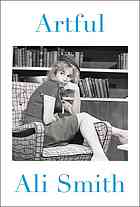
Artful
کتاب های مرتبط
- اطلاعات
- نقد و بررسی
- دیدگاه کاربران
نقد و بررسی

Starred review from October 22, 2012
This contemplative, electrifying, and transformative book comes in four sections, originally delivered as lectures on comparative literature at St. Anne’s College, Oxford. Readers, however, won’t find themselves on the other side of the lectern. Instead, Smith (There but for the), writing in the first person but not necessarily as Ali Smith, opens with grief: the I-persona has recently lost her longtime love and, still in the throes of despair a year later, turns to the papers and research left on her beloved’s desk, ostensibly for a series of talks on literature—the substance of which becomes much of Smith’s actual lectures. Through riveting reflections on the limitations and the limitlessness of stories, Smith considers four aspects of the endeavor of creation: on “time,” “form,” “edge,” and “offer and reflection.” Yet what Smith also provides is the I-persona’s own journey, through her anguish, through her responses to her beloved’s notes and ideas (which the reader also reads) and through some “real” life (visits with a therapist, some mentions of work, etc.). The results are redemptive for everyone, testifying with singular clarity and wit to the immutable necessity for art.

November 15, 2012
Acclaimed Scottish novelist Smith (There but for the, 2011, etc.) considers the places where art and life intersect, sometimes collide and meld. The guide on this extraordinary journey is a woman who, after "twelvemonth and a day" of mourning, sees her dead lover before her. She offers the apparition tea and begins to ask questions, but the responses are garbled and confused. Smith's storytelling facility and critical eye are evident in the fact that this ongoing conversation--adapted from a series of lectures at St. Anne's College, Oxford--about time, memory, loss, longing, love, art and nature stirs the mind and heart all the more because it takes place between the imagination and reality. In the essay "On time," Smith reminds us of Shakespeare's "Devouring Time, Time's pencil, Time's fell and injurious hand, Time's scythe, Time's fickle glass." Even books, she writes, are "tangible pieces of time in our hands...they travel with us, they accompany us from our pasts into our futures...." In each of the essays, the woman continues her struggle with grief and letting go. Her lost lover returns again and again in an alarming state of increasing decay, and she regrets the failings of her imagination to call up an odorless, less-ragged form. Smith seamlessly connects the narrator's smart, funny, regret-infused observations to an expansive discussion of aesthetics, metaphor, the tension between form and fluidity, what it means to be on the edge in life and art, the power of Oliver Twist (in all its forms) and Alfred Hitchcock movies, and the acts of giving and taking. On this quest, the author goes into the "margins that burn with the energy of edit" to shed light on the human spirit through art. But does the grieving woman ever let go of her lover's spirit and move on? It's all beautifully revealed. A soulful intellectual inquiry and reflection on life and art, artfully done.
COPYRIGHT(2012) Kirkus Reviews, ALL RIGHTS RESERVED.

December 1, 2012
As author of the 2012 Weidenfeld Lectures on Comparative Literature, Smith finds inspiration in Milosz's conviction that The purpose of poetry is to remind us / how difficult it is to remain just one person. Indeed, Smith daringly splits herself into two captivating voices: that of a Dickens-loving bibliophile and that of her former lover's ghost. Because that ghost shares the bibliophile's passion for literature, the dialogue evolves into a wide-ranging reflection on how novelists invent reality, how poets cross-fertilize the literary flowers of their predecessors, how filmmakers transform the screen into a dream that absorbs their audience. As unpredictable as an undead vagrant, this scintillating conversation showcases Smith's own gifts as a creative writer. But it also reminds readers of how great literatureof Shakespeare, Lawrence, Hopkins, Ovid, Plath, Rilke, and Flaubertrequires them to reorient their line of vision. NothingSmith shows her readerforces such reorientation more than violating conventional boundaries, often in dangerous ways. These most unlecture-like of lectures deliver the thrill of perilous border crossings.(Reprinted with permission of Booklist, copyright 2012, American Library Association.)

























دیدگاه کاربران